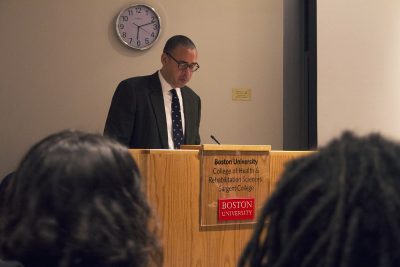
Months ago, when Yale College Dean Jonathan Holloway was scheduled to speak at Boston University’s Sargent College of Health and Rehabilitation Sciences on Nov. 9, he didn’t think about the timing of his talk until it got closer.
“It was only a few weeks ago when I realized I had accepted an invitation the day after the presidential election,” Holloway said to a room of about 50 students and professors Wednesday evening.
Holloway’s lecture, entitled “The Legacies of Jim Crow: Race, Recognition and the Making of the Modern University,” addressed “the phenomenon of discovery – when certain things are all around you all the time, and you don’t notice them,” specifically relating to the discovery of race.
“It’s evident that we are in a moment when a significant portion of the electorate rose up to take back [what] they believe was theirs, although I’m not sure it actually ever was,” Holloway said.
Holloway elaborated on the history of black students facing racism and violence at historically white colleges across the United States, something that is still happening today.
“There has been remarkable changes in so many ways that no one can deny, yet we still find ourselves coming back to the same things,” he said. “Quite frankly, when you have a campaign like we just did, it’s easy to wonder about progress.”
Overall, Holloway said, it is the role of universities to facilitate discussions about race and recruit faculty and students of color from diverse backgrounds.
“The change that’s required is such a daunting task, and I’m feeling quite cynical today,” he said. “I don’t think as a nation we have the courage to invest in ourselves. And I don’t think we have the courage or the capacity to tolerate ideas about ourselves in order to become better.”
Holloway said the discussions about race in education should start much earlier than they do – in public schools rather than just at the college level.
“Students have experiences of discovery and were outraged, like ‘Why didn’t I learn this when I took my U.S. History course? Why are they only coming up now?’” Holloway said. “These are old questions – frustratingly old questions – and students are going to be asking the same questions in 15 years.”
Further, Holloway said, it’s important for people at universities to realize the privilege that comes along with being at a university – an experience many do not have.
“People need to be honest about the space they occupy and recognize what that space means,” Holloway said.
After the lecture, several BU professors said they found Holloway’s discussion especially impactful considering the recent presidential election results.
Nancy Harrowitz, a romance studies professor, said the topic was a timely one.
“This topic is especially important tonight, especially in our post-election trauma that I’m sure a lot of us are feeling,” Harrowitz said.
Virginia Shapiro, a professor of political sciences, said she thought the faculty and staff of universities needed to lead the effort toward progress.
“When you are a dean, it’s pretty easy to tell people what they ought to be doing and how they’re not understanding,” Shapiro said. “But really moving forward takes faculty, respect for faculty and support for faculty who are willing to be brave and take pain. Supporting faculty and talking about how to do things in the classroom is still the best way forward.”
Linda Heywood, an African American Studies professor, said she struggles with the idea of whether school should require ethnic studies classes. Even though BU is diverse, there are still experiences students could come to college without having learned much about, Heywood said.
“An international student could come here and not learn anything about the black experience,” she said.























































































































